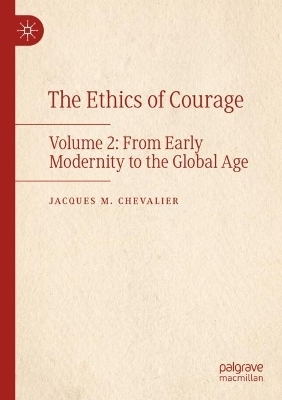
The Ethics of Courage
Springer International Publishing (Verlag)
978-3-031-32745-2 (ISBN)
- Noch nicht erschienen - erscheint am 09.12.2024
- Versandkostenfrei
- Auch auf Rechnung
- Artikel merken
This two-volume work examines far-reaching debates on the concept of courage from Greek antiquity to the Christian and mediaeval periods, as well as the modern era. Volume 1 explains how competing accounts of epistêmê, rational wisdom, and truth dominated classical antiquity. Early Christian and mediaeval thinkers, in contrast, favoured fortitude founded on faith and fear of God over philosophical reasoning left to its own devices.
Volume 2 turns to theories of courage from the early modern period to the present. It shows how the twin laws of polis and physis are at the heart of post-medieval thought. Courage is found at the crossroads of love and dread, freedom and fate, happiness and suffering, as well as power and submission to the ruling order. The later influence of evolutionism, existentialism, and the social and natural sciences on moral philosophy is also addressed at some length. The protection of people's best interests, the passions and powersof the human will, and the rule of active energy in all aspects of life supplant courage formerly viewed through the lens of reason or faith, or a combination of the two.
These new ideas, paradoxically, herald the end of the ethics of courage. They also undermine the courage of ethical thinking. Courage is no longer an end in itself, nor is it a means to happiness "at the end." Regardless of what Gandhi, Tillich, and Foucault have to say about the topic, late modernity and the global age witness a marked loss of interest in courage as an idea worthy of conceptual investigation. Debates about the moral implications of courage give way to the value-free science of resilience, which studies how people can recover from past trauma and find wellness, primarily in the realm of physis.Jacques M. Chevalier is Chancellor's Professor Emeritus at Carleton University, Canada.
Chapter 1 Truth, power, and life.- Chapter 2 The body and the body politic.- Chapter 3 Self-interest and the sovereign.- Chapter 4 Justice, the laws of nature, and God.- Chapter 5 Moral sympathy and higher passions.- Chapter 6 The natural and rational duty to God and country.- Chapter 7 Michel de Montaigne and the vanity of reason.- Chapter 8 Language, self-consciousness, and learning experiences.- Chapter 9 Reasons examined in good conscience.- Chapter 10 The evolution of mind, species, and society.- Chapter 11 Variations in evolutionary ethics.- Chapter 12 Utilitarianism and relativism with a bias.- Chapter 13 Emerson's heroes of truth.- Chapter 14 The courage of despair.- Chapter 15 Nietzsche's animal foes and friends.- Chapter 16 The will to power.- Chapter 17 Thus spoke Nietzsche.- Chapter 18 Courage in the body and the sociable self.- Chapter 19 The courage of disobedience.- Chapter 20 Paul Tillich and the courage to be.- Chapter 21 Throwing courage to the dogs.- Chapter 22 Risk and resilience.- Chapter 23 Courage in the global age.
| Erscheinungsdatum | 19.11.2024 |
|---|---|
| Zusatzinfo | XI, 498 p. |
| Verlagsort | Cham |
| Sprache | englisch |
| Maße | 148 x 210 mm |
| Themenwelt | Geisteswissenschaften ► Philosophie ► Allgemeines / Lexika |
| Geisteswissenschaften ► Philosophie ► Ethik | |
| Geisteswissenschaften ► Philosophie ► Geschichte der Philosophie | |
| Geisteswissenschaften ► Philosophie ► Philosophie der Neuzeit | |
| Schlagworte | Age of Anxiety • Courage • Darwinism • Existentialism • Moral egoism • Self command • Utlitarianism • virtue |
| ISBN-10 | 3-031-32745-4 / 3031327454 |
| ISBN-13 | 978-3-031-32745-2 / 9783031327452 |
| Zustand | Neuware |
| Haben Sie eine Frage zum Produkt? |
aus dem Bereich


